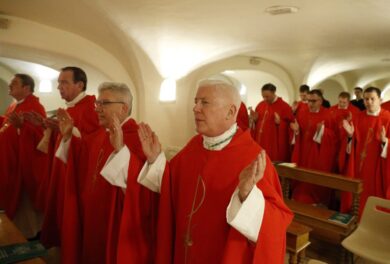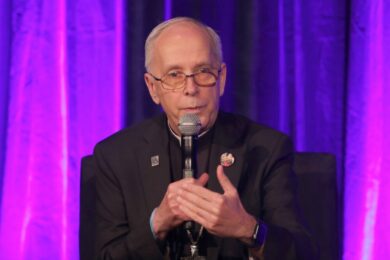December 10, 2024
Bishops discuss immigration, abortion concerns ahead of incoming Trump administration
NATIONAL
By Lauretta Brown, OSV News

Bishop Daniel E. Thomas of Toledo, Ohio, and other U.S. bishops from Ohio and Michigan concelebrate Mass in the crypt of St. Peter’s Basilica at the Vatican Dec. 9, 2019. The bishops were making their “ad limina” visits to the Vatican to report on the status of their dioceses to the pope and Vatican officials. (CNS photo/Paul Haring)
(OSV News) — The church must continue to stand for the dignity of all human life under the incoming Trump administration.
That was the message from Bishop Mark J. Seitz of El Paso, Texas, chair of the bishops’ migration committee, and Bishop Daniel E. Thomas of Toledo, Ohio, the bishops’ new pro-life committee chair, who both spoke with OSV News at the U.S. bishops’ November meeting.
On the abortion issue, Bishop Thomas told OSV News that “the role of the church is very clear.”
“The church has taught forever and she continues to teach that the life of the unborn — as the U.S. bishops have repeatedly affirmed — that it’s the preeminent life issue because in the end the most innocent and vulnerable and voiceless of us are preborn children,” he said.
“We don’t know what that administration is or is not going to seek as policy,” he said of the Trump administration. “We have every idea of what people said in an election cycle. That does not mean that they’re going to be doing those things after their election.”
He said with the new administration, he will “look for the same thing I look for in any administration, that is the capacity to listen to the church, to work with the church and to try to respect what the church is trying to promote, to teach, to advocate and to pronounce and that is the Gospel of the life of Jesus Christ.”
“They can be certain that we will do everything we can to advocate for the dignity and sanctity of all human life and first and foremost, preeminently for the unborn,” he added.
Regarding the incoming Trump administration’s embrace of in vitro fertilization on the campaign trail, Bishop Thomas referenced the church’s long-standing teaching against IVF.
He said that the church will continue to say that “within a marital relationship between a man and a woman,” there should be openness to life, and that life “is the result of two elements which the sexual union is: unitive and procreative.”
If one of those elements is unnaturally impeded, he said, then “that is problematic both for what the church believes regarding life itself and what the church regards as marriage and family because ultimately it disrespects individuals and it disrespects persons.”
He said that while “the church is deeply understanding of and compassionate for those Catholic couples who have a difficulty having children,” at the same time, IVF “blocks the unitive dimension of a couple’s marriage, marital love and — as a result — makes it something which we are not able not only not to condone, but we have to say what marital love is truly like.”
Bishop Thomas expressed gratitude for the three pro-life victories in the 2024 election in the defeat of ballot measures in Florida, Nebraska and South Dakota.
While he deferred to the episcopal conferences in those states regarding their specific strategies, he said “there were practices across the board that were done that were very, very critical to education, to promotion, to clarity so that people would understand clearly what they were voting on because many of our Catholic people did not understand what they were voting on nor how radical those things were.”
“The reality is now we have to go forward and still press to work against those issues,” he said, “but I would certainly hope that the witness to life has not been diminished and I think we can say that people are encouraged.”
As for the path forward for the pro-life movement, Bishop Thomas said that path is “the path of the cross and Jesus trod that path for us.”
“Some people thought that with Roe v. Wade, it was over and it was done,” he said. “Tragically, now we’ve seen each state take to itself to address that and we will not be deterred and we will not in any way be discouraged because we know that we have the one who is the way, the truth and the life — Jesus himself — and if he is that, then we will follow his way. We will trust in his truth and convey that truth and we will depend on the life that he gives us to not only promote, but defend that life itself.”

Bishop Mark J. Seitz of El Paso, Texas, gestures June 13, 2024, during a news conference at the U.S. Conference of Catholic Bishops’ Spring Plenary Assembly in Louisville, Ky. (OSV News photo/Bob Roller)
Regarding the church’s concern for the lives of those seeking asylum in the U.S. under the Trump administration, Bishop Seitz told OSV News that for “those who are arriving to our southern border, we have a great concern for the suffering that they will undergo because Mexico has become an extremely dangerous place that profits off of the lives of immigrants.”
He said immigrants are “faced with extortion from not only organized crime, but from official police organizations and security organizations. The organized crime has found that they can make a lot of money off of them by kidnapping them and contacting people — relatives and the like — especially in the United States in order to pay the ransom. Many of them are facing attacks on their persons, physical attacks, rape.”
In light of what he sees immigrants face, he expressed concern that the U.S. is ignoring asylum law and “not allowing people even access to make an asylum claim.”
“You might have opinions on whether people who come are truly candidates for asylum,” he said, but “if you do not allow them a process, then are you willing to accept in conscience, the responsibility of sending people, perhaps to their death, who haven’t even had the opportunity to make that claim?”
“We need an effective, active asylum system, and remember, asylum by its nature, doesn’t allow you to wait six months or five years, for a person, in most cases, they are being under threat right now,” he said, “their children are starving right now and we need to have some response.”
He said that in order to mitigate the “extreme situation in which desperate people, who feel that they’re running for their life, need to choose desperate means in order to cross into the United States,” there should be “opportunities for asylum and you provide opportunities for work where work is available and you vet people to give them a visa, so they can work seasonally or longer term.”
He referenced the 175 people who died this year in the El Paso sector of the border that he ministers to; most of them died because “they didn’t have water and they were in the desert on a hot day.”
“They’re taking those risks for a reason,” he said. “They’re not stupid. They just know they don’t have any other options right now.”
Bishop Seitz is also concerned about continued legal challenges such as the one the El Paso Catholic nonprofit, Annunciation House, faced from Texas Attorney General Ken Paxton this year.
He said the state of Texas is “raising some direct challenges to the work of the church and other organizations that serve people who are extremely vulnerable” and that the vast majority of the immigrants served by these organizations “have been vetted through the system, they’ve applied, they’ve turned themselves in, they’ve been processed and given the opportunity to make their asylum case.”
The church, he said, has a responsibility “not to be doing the security vetting,” but “our task is to care for people who are in need. It’s simple.”
Bishop Seitz emphasized the church’s long history of teaching on immigration. “We’ve had a day, a World Day for Migrants and Refugees, for more than 100 years,” he noted, “from the early 1900s, but even before that, the church has always received pilgrims and migrants. And so, it is one of her fundamental works, the kind of work that hospices did in the past led to the creation of hospitals which were a Catholic work of grace.”
He encouraged the faithful to “read what the church has to teach” including statements from St. John Paul II and Pope Francis on the issue. He also encouraged people to “meet a migrant, meet a person who has recently entered your community. Ask them to tell you their story, and you’ll come to a very different understanding than what you’re perceiving in the media.”


 Facebook
Facebook Youtube
Youtube
